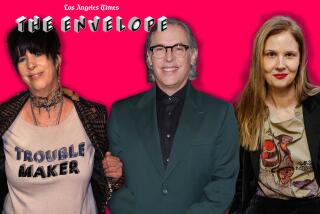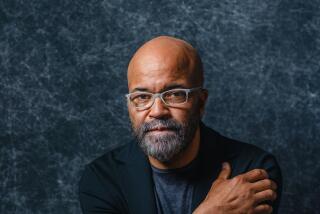Richard Gere’s stock is up
AMAGANSETT, N.Y. — Some actors take a part because they admire a director’s vision or love the script. Richard Gere signed on to his new Wall Street cautionary tale “Arbitrage” because he liked how the filmmaker responded when he slammed him against a wall.
Gere and Nicholas Jarecki were dining at the upstate N.Y. bed-and-breakfast Gere owns, discussing the actor’s potential involvement in the dramatic thriller that opened Friday to strong reviews. Then Gere made an odd request: He wanted Jarecki to read with him as the wife of Gere’s character. Before long the two were standing up at their table, diners looking on, as they got into a heated scripted exchange.
Then things really grew strange.
“He threw me against the wall and looked at me with these seductive eyes,” Jarecki recalled. “And I looked at him right back and said — as Nick, mind you — ‘I could kiss you right now.’ He grew really quiet, and I was nervous I said something wrong. Then all of a sudden he laughed and said: ‘You’re as crazy as I am. Let’s do this thing.’
“This thing” is the kingpin-brought-low story of “Arbitrage” and Robert Miller (Gere), patriarch of a rich Wall Street family who gets in over his head when he tries to cover up both a bad investment and the negligence that led to his mistress’ death. As the deceptions pull Miller in deeper, his family also tightens its grip — particularly his unhappy wife (Susan Sarandon) and his devoted daughter and heir apparent (Brit Marling), who is stunned by his malfeasance.
Jarecki wrote the movie in the wake of the Bernie Madoff scandal. But he didn’t intend it as a roman à clef of a criminal who callously ruined hundreds of lives — “Madoff seemed psychotic, not human, and that didn’t seem that interesting.” Gere doesn’t play it that way either, going for more of a decent man who lets a greedy impulse get the better of him.
It’s Gere’s first lead role in four years and one of the most socially charged movies he’s made. Depending on your point of view, Miller is either a wonderfully appropriate or incredibly odd fit for the activist actor, who isn’t shy about decrying Wall Street practices.
“This movie is much less about the specifics of the financial world and much more about the emotions, the mentality, the motivations of people who are involved with it,” Gere said. “It’s about greed and what do you do with it. It captures where we are now.”
Gere, who turned 63 at the end of August, looks spry with his trademark thick mane of hair and youthful face. He has the same easy gait and piercing eyes that have been making women of a certain age swoon for a long time. Though more talkative in person than in some of his brooding roles, Gere can also come off as earnest and opaque. After a long day on set when Jarecki said he was running out of energy, the famous Buddhist turned to the director and said, with some seriousness, “Don’t you know that energy is infinite, Nick?”
Gere is talking at the bar of the popular music venue Stephen Talkhouse. Over the years he has frequently come to this place, an intimate, grungy spot where everyone from Bob Dylan to Bon Jovi has played. Gere, a longtime New York resident, vacations every summer in nearby Sag Harbor with his wife, Carey Lowell, and their 12-year son, Homer. An avid guitar player and collector, Gere looked around the venue and marveled at how small it was. He recalled a concert he saw the year before with the zydeco-flavored New Orleans musician Dr. John. “Katrina was very much still alive for him,” Gere said. “You could really feel it.”
After “party boy,” “heartthrob actor” and “political activist,” Gere has over the last decade added another label: family man. He said he is reluctant to take a movie that shoots outside New York for that reason; the last movie he made in Los Angeles was, surprisingly, “Primal Fear” 16 years ago.
In fact, Gere said, he is more reluctant to act in general. After being one of the most steadily working actors for the last two decades, he has no major new parts lined up. “My life is incredibly rich. For me to commit three months to make a movie is a very difficult decision,” he said. He added that he had just turned down “quite a good script with a director of the moment” even though it was subtle and dark.
“It wouldn’t have been that challenging,” he said, then, seeing a quizzical reporter raise his eyebrows, added, “You know, just because it’s dark doesn’t mean it’s more challenging. Life is challenging. You think it’s easy to be positive? You think it’s easy to be loving?”
And even when he does work, he said, he’s changed his approach.
“There was a point when I would live it 24 hours a day. I remember doing a show on Broadway where I played a Puerto Rican pimp and I spent a month on 8th Avenue with every hooker I could find,” he said. “I still do a lot of research. But the mechanism of these things is less forced.”
For “Arbitrage,” Gere interviewed a number of Wall Street traders, not just about their professional lives but their personal ones — how they spend their downtime, what their romantic relationships were like. The idea was to find the people behind the suits, especially what drives them to succeed and what makes them feel vulnerable.
Off screen, Gere is known for his political activism; he’s in the company of Sean Penn and George Clooney — stars known for using their positions for social change. It’s easy to roll one’s eyes — people of privilege dropping in on unfortunate places to show how much they care.
But Sarandon, who’s also taken heat for her political activism, said it’s much more than that.
“Richard puts himself on the line, and that’s very rare in this business,” said Sarandon, who also starred opposite Gere in the 2004 drama “Shall We Dance.” “People in Hollywood are not political, not really. Richard was active in the early days of the AIDS epidemic when it was not cool to be involved. He was banned from the Oscars for denouncing China. That’s not posturing, that’s courage.”
Gere continues his efforts to pressure China on Tibet (he calls the Communist regime “brutish and thuggish and unable to help themselves,” one of many such statements he has made over the years). He visits Hong Kong and Buddhist sites in India, but he is not allowed on the Chinese mainland.
Gere is able to have an influence on the world stage because of his success on the big screen — a success that nearly didn’t happen.
Despite promise as a theater actor and roles in movies like “American Gigolo” and “An Officer and a Gentleman” in the early 1980s, Gere was not a factor for most of the latter part of the decade. The late agent Ed Limato warned him that his acting career was going off the rails.
Gere said he wouldn’t have done two movies in particular had it not been for that poke. Yet the films — “Internal Affairs” and “Pretty Woman” — wound up defining his career.
“It could have been a case of ‘OK, that guy had his shot; time for someone else,’” Gere said “But that wasn’t my destiny.”
PHOTOS AND MORE:
PHOTOS: Hollywood back lot moments
Latest movie reviews
PHOTOS: NC-17 movies: Why they got the rating
More to Read
Only good movies
Get the Indie Focus newsletter, Mark Olsen's weekly guide to the world of cinema.
You may occasionally receive promotional content from the Los Angeles Times.











